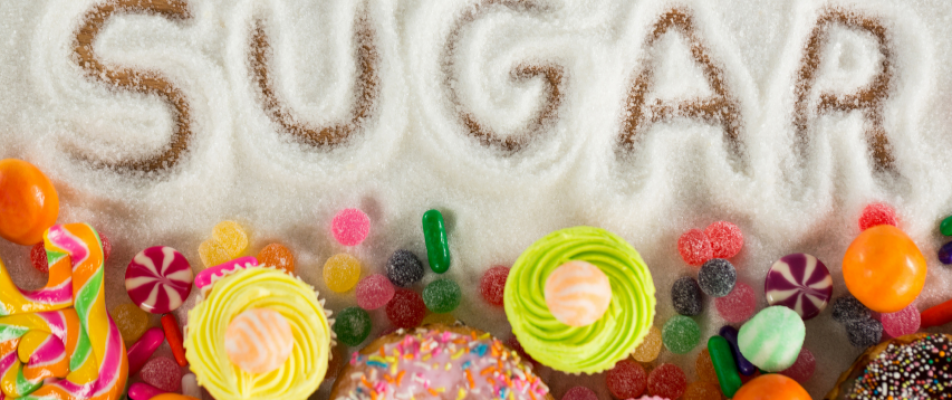
Your Body on Sugar
Stop and think before you grab that handful of candy.
October is here. Halloween – my least favorite holiday because of all the crappy candy everywhere you look – is here. It is as good a time as any to remind ourselves that processed sugar-y foods really aren’t good for us. The less we eat them, the better. Here’s why. (Keep this in mind when you think about how Halloween festivities will go!)
Sugar is a Huge Problem
Blood sugar, also known as blood glucose, comes from the food you eat, namely carbohydrates, or carbs. Carbs are one of three macronutrients that all foods break down to: Carbs, Fats, Proteins.
Blood sugar is used for energy for the moment. Sugars that are left over, circulate in the system and are eventually stored in your fat cells for later use. Too much sugar circulating for too long can be harmful and can lead to weight gain. The more circulating sugars, the less sensitive your body becomes to insulin, which is the hormone in charge of bringing glucose into the cells to be used. As a result, your blood sugar levels can rise. Eventually, insulin resistance and eventually type 2 diabetes may result.
The Goldilocks Solution
It’s about finding that not too high, not too low, just right blood sugar balance. Blood sugar that is too high can lead to diabetes, but if it’s too low, that’s not good either. We’re looking for JUST RIGHT balanced, stable levels throughout the day.
Watch That Middle Weight Gain
Losing weight and weight maintenance is one of the best ways to get your blood sugar balance under control. We have lots of fat cells in our midsection–so if glucose must store somewhere, there is a good chance it will collect in our midsection, which is NOT ideal and not healthy. And it’s this scenario that gives us that dreaded muffin top.
Unbalanced Blood Sugar Symptoms
- Fatigued
- Super thirsty
- Increasingly tired
- Blurry vision
- Frequent headaches
- Tingling and numbness in your hands and feet
- Increase in yeast infections
Food Quality Matters
Diet obviously has a ton to do with balanced blood sugar. There is a big difference between a Snickers and an orange or brownie vs. a banana. Whole, real foods are ALWAYS better. For example, the banana and the brownie may contain the same amount of carb grams, but the banana also has lots of fiber and other vitamins and minerals that the body can use. The brownie or Snickers contain loads of sugar but not a lot of other nutrient-dense items to help your body work. Choose the fruit when you can. Save the brownie or the Snickers as the “celebration” treat.
Takeaway: Eating REAL WHOLE food as much as possible, everyday, is a great answer and goal.
Take These Actions to Manage Blood Sugar:
- Watch your total carb intake: If you eat carbs all day long, your sugars will be up all day. If you limit your overall load, it gives your body a chance to use what you’ve given it.
- Watch the color of your carbs: White breads/pastas/rice is faster to go into the system than brown breads/pastas/rice because of the increase in fiber. Brown is better.
- Add fiber:Meaning brown (see above) but also colorful fruits and veggies, and some legumes and whole grains! More is better since fiber slows down sugars into the system. Shoot for at least 25g (women) or 35g (men) per day.
- Stay hydrated:Being well hydrated lowers blood sugar levels.
- Add fat and protein:Adding healthy fats (avocado, olive oil, nuts) and proteins (chicken, eggs, fish, beans) slows down the breakdown of blood sugars into the system. Eating in combination really helps balance blood sugar.
- Boost food helpers:Apple cider vinegar and cinnamon are two foods that have been researched and proven to help drop blood sugar levels in the body. Use liberally!
- Don’t get too hungry; eat throughout the day: This assists in balancing blood sugar. Those 3pm lulls make it difficult to NOT overeat at dinner. So, have a snack and then you’ll be able to cope with a normal dinner and not a binge-eating dinner.
- Exercise regularly:This helps with weight maintenance. Muscles use up circulating blood glucose and so it stays down naturally. More exercise has even been proven to help lower your blood sugar for many hours after you stop moving. Going for a walk before or after you eat helps to sensitize insulin and keep blood sugar lower.
Lifestyle Factors That Impact Blood Sugar Balance:
- High stress:Watch your stress. It negatively impacts blood sugar.
- Lack of sleep:Not sleeping enough is detrimental to your blood sugar levels.
- Food timing:Eating right before bed is not as good as eating a bit earlier.
- Too much caffeinenegatively impacts blood sugars.
Be Mindful
To sum up, being mindful of your blood sugars is insurance for your health. It is under your influence and determined by your food and lifestyle choices. At Healthy Nest, we don’t think you need to be perfect, but you do need to pay attention, order wisely, plan your meals as much as you can, exercise, move and ask for help when you need it.
Reach out to us if you need more help. We’re happy to talk with you about solidifying strong, healthful food habits and managing your blood sugar. Schedule a free 20-minute consult with a Healthy Nest holistic nutritionist. Let’s chat natural weight loss, mindful eating and personalized nutrition.
